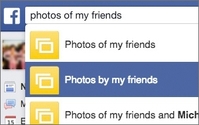Industry Speculates On Facebook's Post-Bing Play, Will It Include Search?
- by Laurie Sullivan @lauriesullivan, December 15, 2014
 Bing's Web search -- an additional feature offered on Facebook -- served up contextual, relevant listings, but didn't make a significant contribution to the data that is integrated into the site's
advertising platform. It wasn't their data. Many industry insiders questioned the reason for the Bing integration, aside from Microsoft's small investment in the company.
Bing's Web search -- an additional feature offered on Facebook -- served up contextual, relevant listings, but didn't make a significant contribution to the data that is integrated into the site's
advertising platform. It wasn't their data. Many industry insiders questioned the reason for the Bing integration, aside from Microsoft's small investment in the company.
Facebook's advertising platform was not greatly impacted by dropping Bing because the social site doesn't run sponsored listings or advertising products around search, per industry insiders, who view it as another step closer to keeping member data in the network. It helps the social site build a powerful search retargeting platform by creating search, building query volume, and offering the ability to serve a display ad through Atlas.
A Facebook spokesperson confirmed Monday that the consumer will continue to focus on search inside the platform, but declined to comment on advertising-related questions. No matter -- industry insiders have their own opinion.
Facebook could easily create another layer of advertising in a search product, says Gerry Bavaro, chief strategy officer at Resolution Media, an Omnicom agency. "Since they are limiting search to the site, they will likely build out more advanced search and advertising features," he said. "I think they may be getting ready to release an advertising platform based on queries."
Intent and keyword-based signals based on the requirement that members log in to use the platform could become a very powerful ad-targeting tool, per Bavaro. Searching on Facebook vs. moving to Google, Bing or Yahoo didn't make much sense. The power will come with a combination of data. If Facebook builds and releases an advertising platform based on data inside of Facebook, it is sure to include member profiles, behaviors and search queries.
With Atlas, which is moving toward people-based targeting, Facebook could use the search query data to target ads to members who leave the social site. "The move powers a much more valuable search feature that leverages log-in data and behaviors, and when you leave Facebook it becomes a reverse retargeting tool in the future," Bavaro said. "That's another signal of intent when moving across the Web, if the data is married to Atlas."
Bavaro points to Google as an example, saying the company's retargeting platform becomes a natural extension of its advertising network based on log-in query data and ad tags from brand Web sites.
"If you assume that better targeting equals better results for advertisers, this means advertisers will be willing to pay a higher CPM, or CPC, on FAN, compared with GDN," he said. "And this means that publishers will receive a higher eCPM, which will lead publishers to abandon GDN in favor of FAN."
"The more page views Facebook gets the more advertising dollars they sell," said an industry source who asked for anonymity. "Keeping people on the site creates benefits. If they don't think they're losing intent information, but capture another half-page per person, based on their size, that could be a huge lift."


